Buffalo Wyoming
Gateway to the Bighorns
Article Date: March, 2015
Article and Photography by Mark Quasius
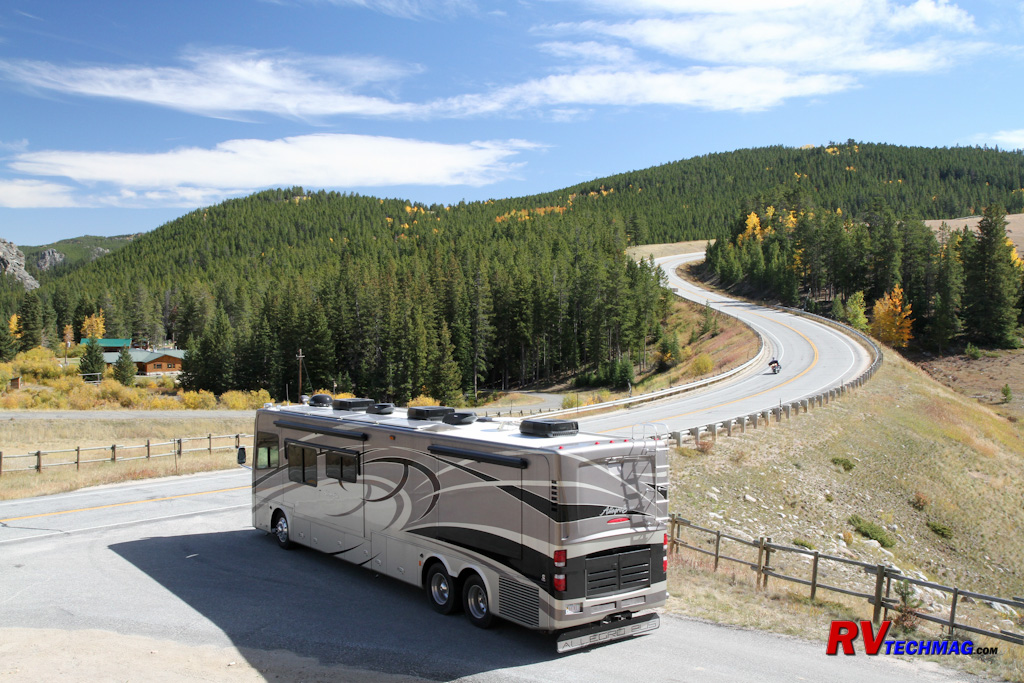
A Town in the Right Place
Every now and then you find one of those spots that just happens to be located in the right place. Buffalo, Wyoming is one of
those spots. Located where I-25 meets up with I-90 it's smack dab in the middle of two well traveled routes. It's also nestled at the foot of the
Bighorn Mountains and offers the only really good route across them for an RV. Buffalo is also the center of a ton of western lore. The Johnson County
cattle wars were centered in this area. The Bozeman Trail passes right through town and numerous clashes between the Sioux Indians and the many
cavalry forts placed along the trail took place in this area. The downtown is a national historical area and was frequented by many outlaws, including
Butch Cassidy and the Sundance Kid, who were based out of the nearby Hole in the Wall area.
Buffalo is particularly suited as an RV destination. A number of excellent campgrounds can be found in Buffalo and the US Forest
Service primitive campgrounds in the Bighorn Mountains are also available for those who prefer to rough it and get back to nature. The local residents
are genuinely friendly and you'll feel right at home walking the streets and visiting the shops and eating establishments. RV related services abound
and the Cenex station on the edge of town is very big rig friendly so you'll have no problem maneuvering your 80' Bus conversion with dual tandem
trailers to the diesel pumps. A scenic walking trail follows the river from the Bozeman Trail marker to the downtown area which is a great place to take
your dog for a walk. We found that Buffalo was very pet friendly and our German Shepherd was invited into the downtown visitors center, where they even
fed him a treat and gave him a bowl of fresh, cool water.
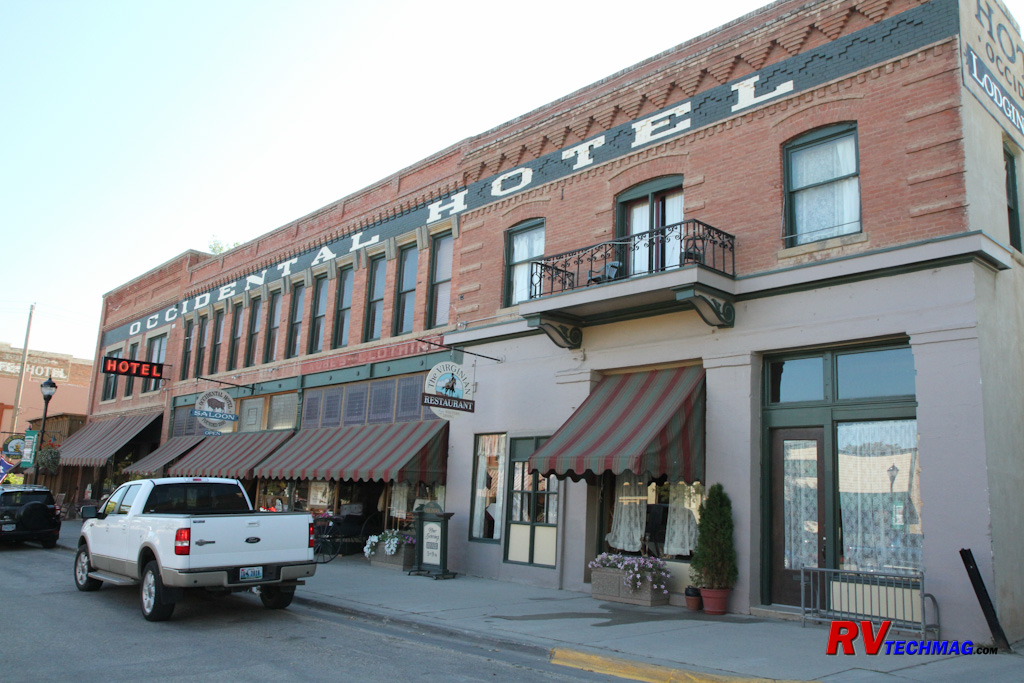
The Occidental Hotel looks just like it did back in the 1880s when famous people such as Butch Cassidy, the Sundance kid, Calamity Jane, and
Buffalo Bill Cody stayed there.
One particular place of interest is the Occidental Hotel. Walking into the front door of the Occidental is like stepping through
a time portal into the past. It looks just like it did back in the 1880s when famous people such as Butch Cassidy, the Sundance Kid, Calamity Jane, and
Buffalo Bill Cody stayed there. The lobby is a true museum and photos of days long past adorn the hallways and the old barber shop. It's still open for
business and you can choose from any number of restored rooms for your stay. In fact, Owen Wister wrote portions of "The Virginian" while staying at the
Occidental and his suite is one of those available.
One big draw is the historical Occidental Saloon. If you look up you'll still find 23 bullet holes in the copper clad ceiling.
In the old days shootings were common and sometimes poker games would last for days. You can still order your favorite beverage at the 25' long oak bar
but the clientele has tamed down a bit so you probably won't have to watch out for flying lead any more.
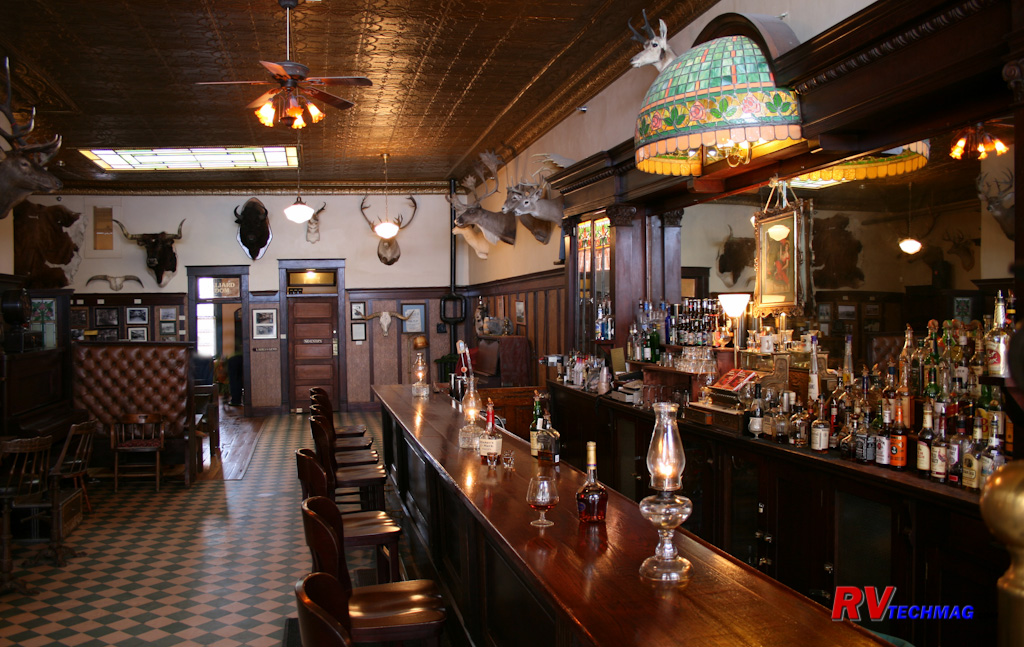
The 25-foot oak bar at the Occidental still serves guests today and rests beneath a bullet-riddled ceiling from a more violent era.
One thing we always do when stopping in Buffalo is eat dinner in the Occidental's restaurant, which is named "The Virginian".
Their chef has previously managed 5 star restaurants and the menu is excellent to say the least. However, this is Wyoming so you really need to try the
beef or bison. If you are lucky enough to be there on a Friday or Saturday night be sure to try the Cattleman's Cut of Prime Rib. That mouth watering
delicacy will give you a whole new appreciation for Wyoming beef.
The Jim Gatchell Museum is one of the best museums covering western history that you'll find anywhere. Its extensive collections
range from the early days, through the Indian wars, settlement of the area, geology, and even include parts of a World War II B-17 bomber that crashed in
the nearby mountains. An extensive collection of firearms, wagons, and Indian artifacts is present.
Gateway to the Mountains
Buffalo is a great place to base yourself from when exploring the Bighorn Mountains. The Bighorns are like a massive wall
that runs north to south and there are really only three possible routes that cross them. If you head up I-90 a bit to Sheridan you can take US-14
up into the mountains. US-14 climb a series of switchbacks until it reaches the top, where it continues west to Burgess Junction. These switchbacks
aren't that bad for an RV and there are a number of scenic overlooks where you can rest you vehicle if needed. The portion of US-14 that climbs the
east face of the Bighorns can safely be taken in either directly with a large RV.
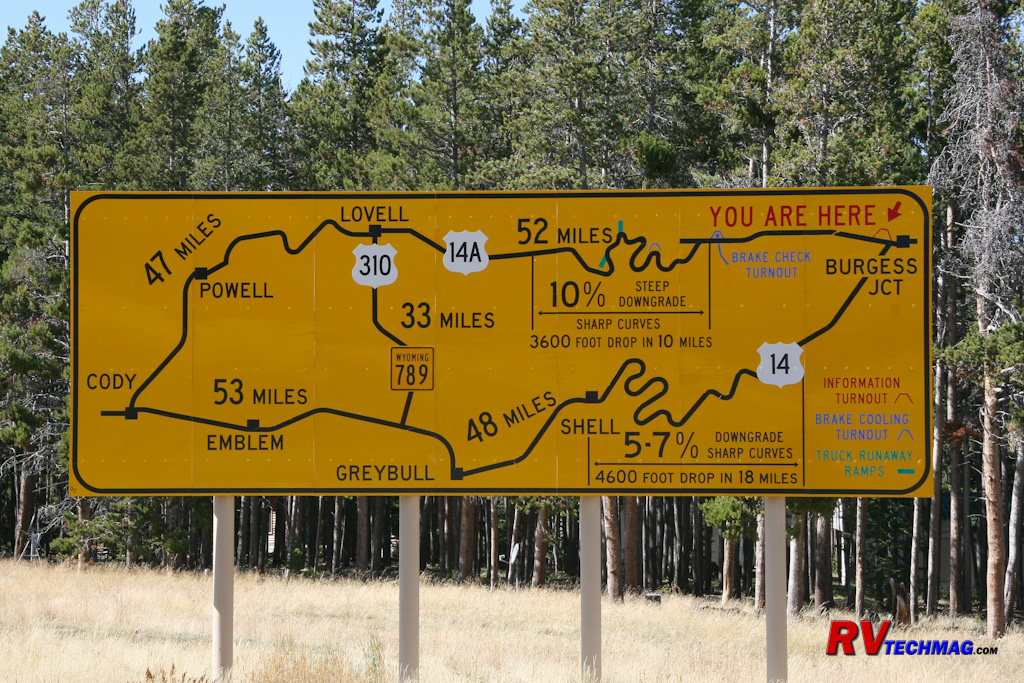
This sign at a pullout near Burgess Junction is a mandatory stop for trucks and illustrates the hazards involved with descending the west face
of the mountains via U.S. Route 14 or U.S. Route 14A.
However, once you leave Burgess Junction to head down the west face of the mountains things get pretty ugly for large vehicles,
such as an RV. There are steep grades that seem to go on forever with no real room to rest your RV. The road splits into US-14, which heads to Greybull,
and US-14A, which heads to Lovell and the wild mustang refuge in Bighorn Canyon's Pryor Mountains. US-14A is particularly deadly with its 10% grades.
I would recommend not taking US-14 or 14A when heading westbound across the mountains because odds are good you'll lose your brakes due to excess fade
and heat and stuffing an RV into the runaway truck ramps isn't a good thing. I have taken both 14 and 14A in an eastbound uphill climb with a powerful
diesel pusher motorhome but it was a slow climb and many smaller RVs or tow vehicles pulling trailers wind up burning up transmissions on that climb.
For anyone traveling by RV taking US-16 is a much better, and safer, choice.
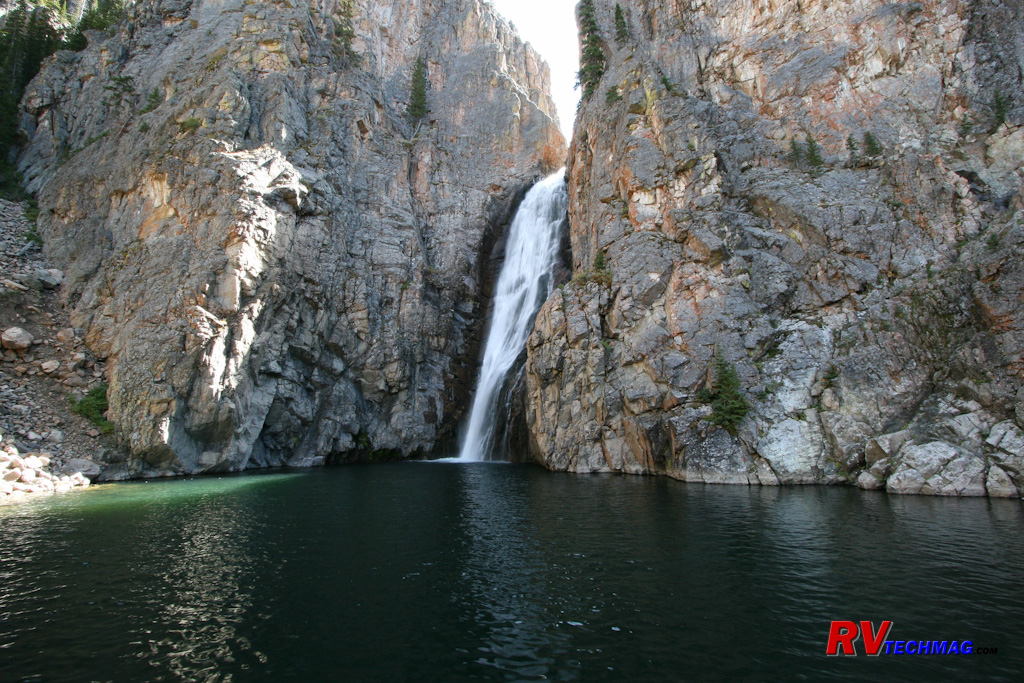
This is Porcupine Falls. Just one of the many areas accessible from one the Bighorns numerous hiking trails.
US-16, also known as the Cloud Peak Scenic Skyway, leaves Buffalo and crosses the southern end of the mountains. What separates
US-16 from 14 is that 14 climbs over the hump of the mountains while 16 travels through valleys and canyons and doesn't have those steep grades. US-16
can safely be taken in either direction by any RV and there's plenty of room to let your vehicle breath rather than subject it to those continuous
climbs on 14 or 14A. It's also the most scenic route. Beginning in the lower ranch land country it begins its eastbound climb gradually, passing through
numerous canyons, including the scenic Ten Sleep Canyon, passing by beautiful streams and a variety of geological features as it works its way up into
the mountains. Once up top you'll cross large valleys, pass streams and lakes, and eventually reach Powder River Pass. Descending down the mountains
towards Buffalo is not a major event nor does it has those sheer cliff drop-offs that can be unsettling to some.
|
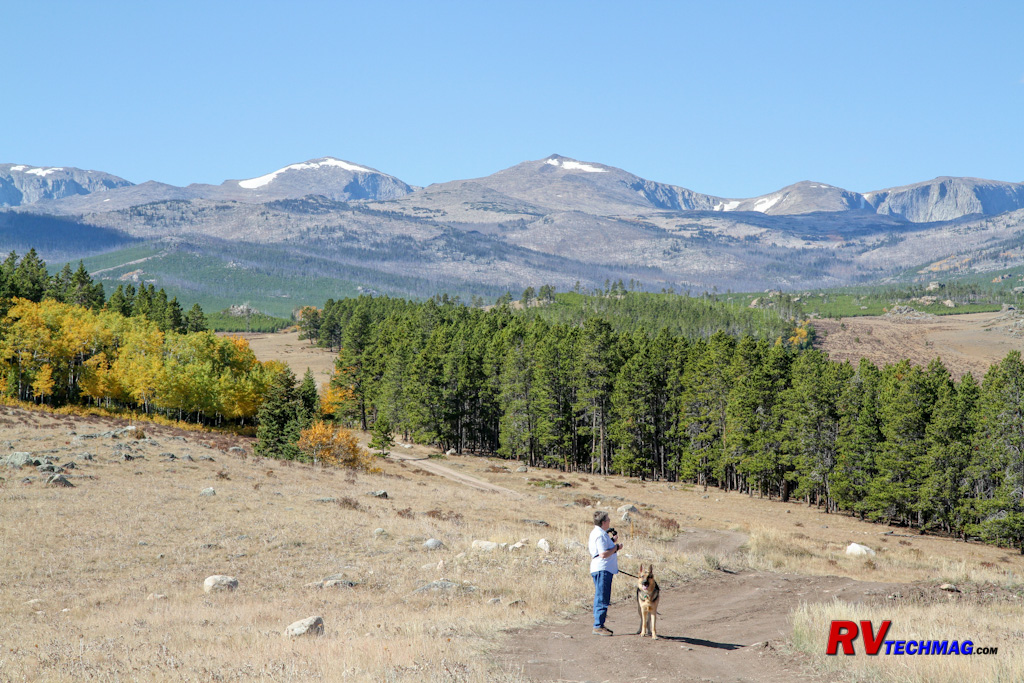
The many side roads found along the Cloud Peak Scenic Highway offer excellent views of the mountains and basins found in the Bighorn Mountains.
|
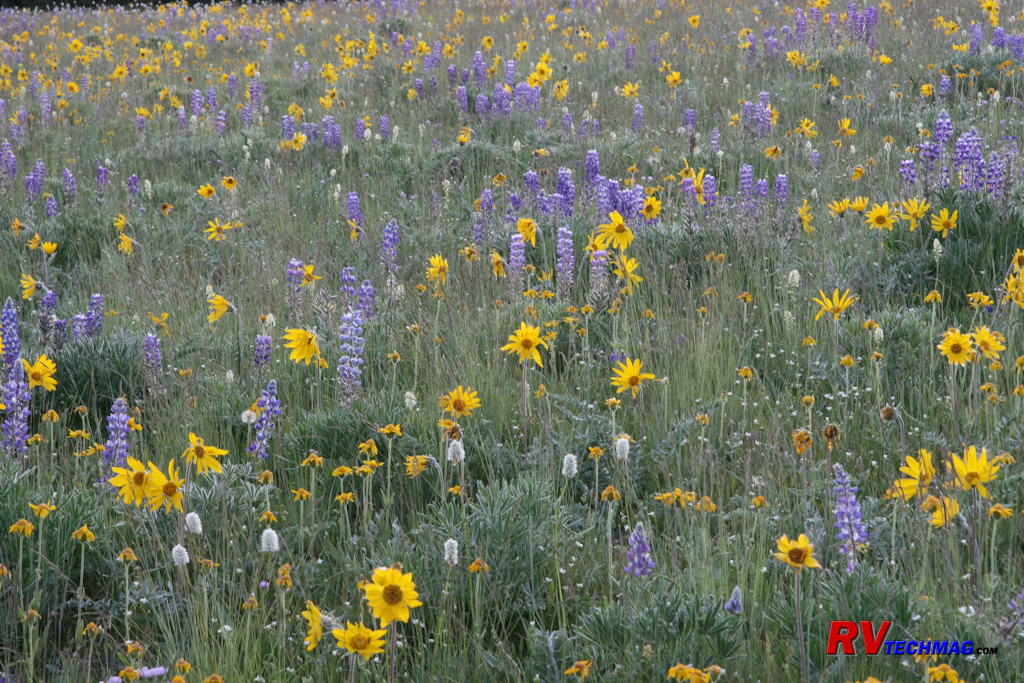
In July wildflowers will be found blanketing the high meadows of the Bighorn Mountains.
|
US-16 also gives you the best access to a number of gravel or dirt side roads that take you to some amazing scenery. Once you
set up camp in Buffalo you can take your tow vehicle and explore the mountains to your heart's content. Be sure to bring your camera because the odds
of seeing Mule Deer, Moose, Elk, and other wildlife are good - especially if it's in the evening or early morning. If you have a four wheel drive
vehicle your opportunities expand even farther. Rocky trails take you into places such as Soldier Park, where a pair of graves from the cavalry days
still exist. A number of ATV trails can also be found in the Cloud Peak Wilderness and permits, maps, and information can all be obtained at the US
Forest Service office in town.
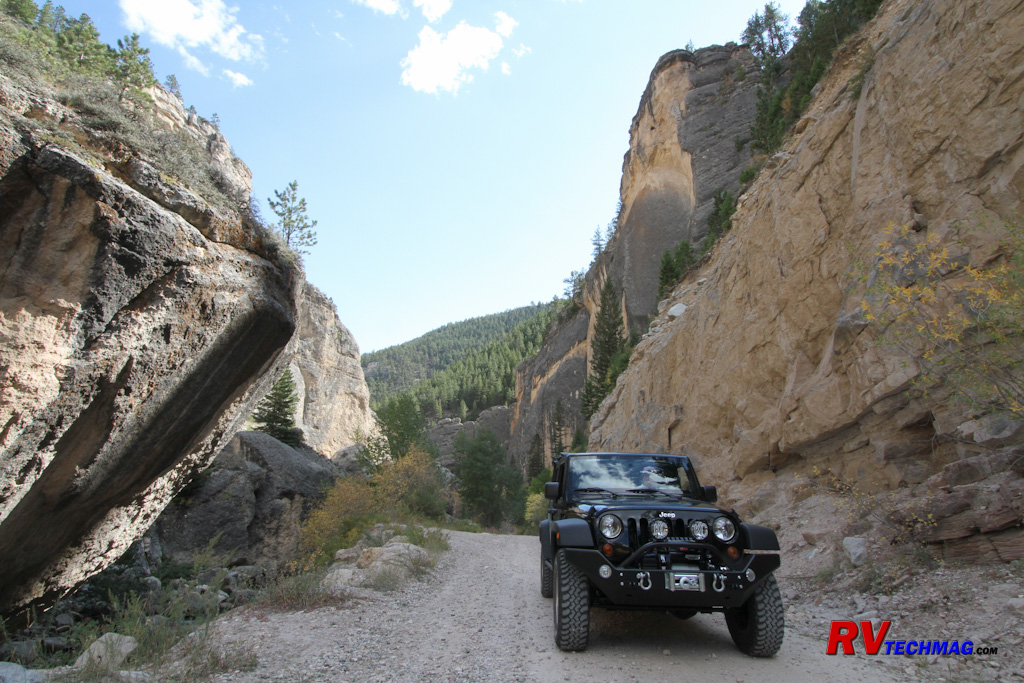
Crazy Woman Canyon is a must-see drive. This road takes you through the canyon and streams as it connects U.S.-16 to the ranch roads just south of
Buffalo.
If you are real adventurous consider a climb up Bomber Mountain. In 1943 a B-17 Flying Fortress lost its way during an evening
flight and crashed into the mountain. The wreckage wasn't found until 1945 when the camouflage paint had finally worn off of the plane, making it
visible to hunters when the sun reflected off of it. The bodies were removed but the wreckage remains and is scattered over a large area. A few parts
of the plane were removed and are now on display in the excellent Jim Gatchell Museum in downtown Buffalo. The bomber rests on both sides of the ridge
on top of the mountain so you'll need to research this further if considering this hike. The hike will require the entire day and you'll need to be in
good physical shape in order to scramble up the 12,840' tall mountain.
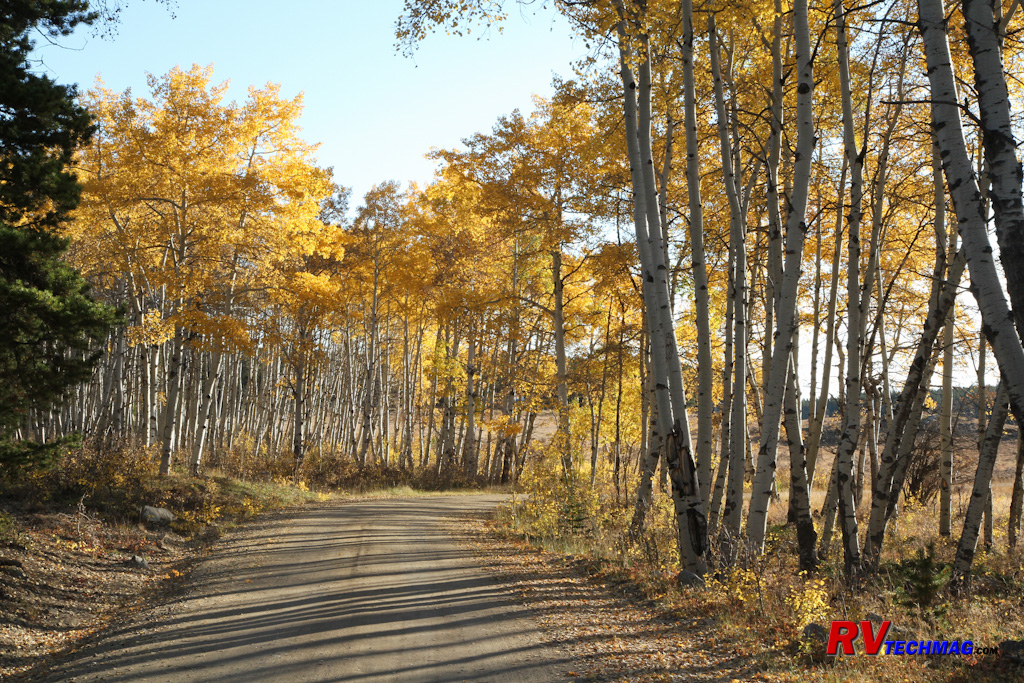
Fall is an excellent time to tour the Bighorns when the Aspens turn shades of yellow and amber as the sun sets lower in the sky.
North on the Bozeman Trail
|
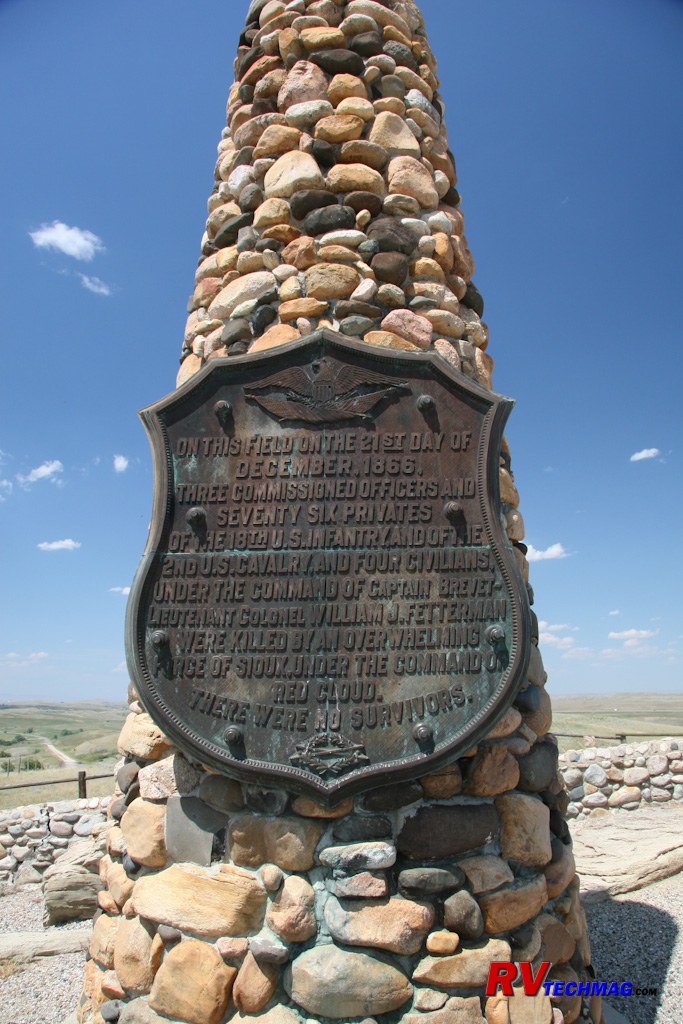
A stone tower and plaque mark the spot of the Fetterman Massacre. An interpretive walk through the battlefield details the action that wiped
out Captain Fetterman's 80 man command.
|
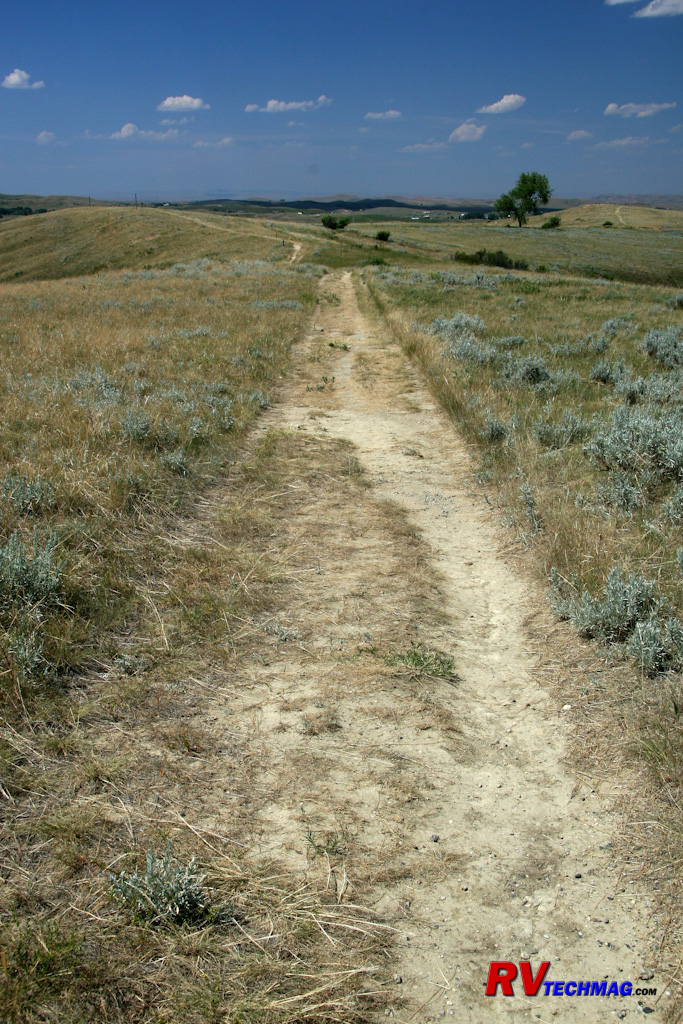
Ruts left by a large number of wagons over the years still mark the Bozeman Trail in various locations today.
|
Heading north on I-90 gives you numerous access points to the Bozeman Trail. The Bozeman Trail was mainly used by miners
traveling north to the gold fields in Montana. Because it passed through the heart of the Sioux Indian nation, a number of forts were built along
the trail to protect the travelers and settlers in the area. Of course this didn't sit well with the Sioux and a number of skirmishes took place
in the area. A few miles north of Buffalo is Fort Phil Kearney, which is open for visits by tourists. A number of wood cutting expeditions were
sent out from the fort to cut timbers to expand and supply the fort, which resulted in clashes with Indians. Sites such as the Wagon Box Fight and
the Fetterman Massacre are well preserved. The Fetterman site is particularly interesting. In 1866 Captain Fetterman ignored orders and ventured
out of site of the fort with 80 men. Red Cloud baited him into chasing a small party of Sioux into a valley where an ambush party of more Indians
waited. All of the men in Captain Fetterman's command were killed. Interpretive markers are place along the walking trail through the battlefield.
Both of these sites can easily be accessed by passenger car from the Story exit.
|
Continuing further north will take you into Sheridan. Just north of Sheridan you can take US-14 up into the mountains.
A popular four wheel drive road is the Red Grade Road, which leaves I-90 just south of Sheridan and takes you up into the true backcountry of
the mountains. You'll pass cascading streams and even a hidden mountain top reservoir created to catch snow melt. Eventually this scenic drive
connects with US-14 near Burgess Junction. West of Burgess Junction is the Medicine Wheel site. This location is considered sacred by the Sioux
who used it for ceremonies and vision quests. The wheel consists of rocks placed in a large circle with 28 spokes radiating out from a center
point. The spokes line up with sun rise or sunset locations at the summer solstice and other key times in the lunar calendar. The site is a 1.5
mile walk from the parking area but handicapped visitors are allowed to drive right to the site.
|
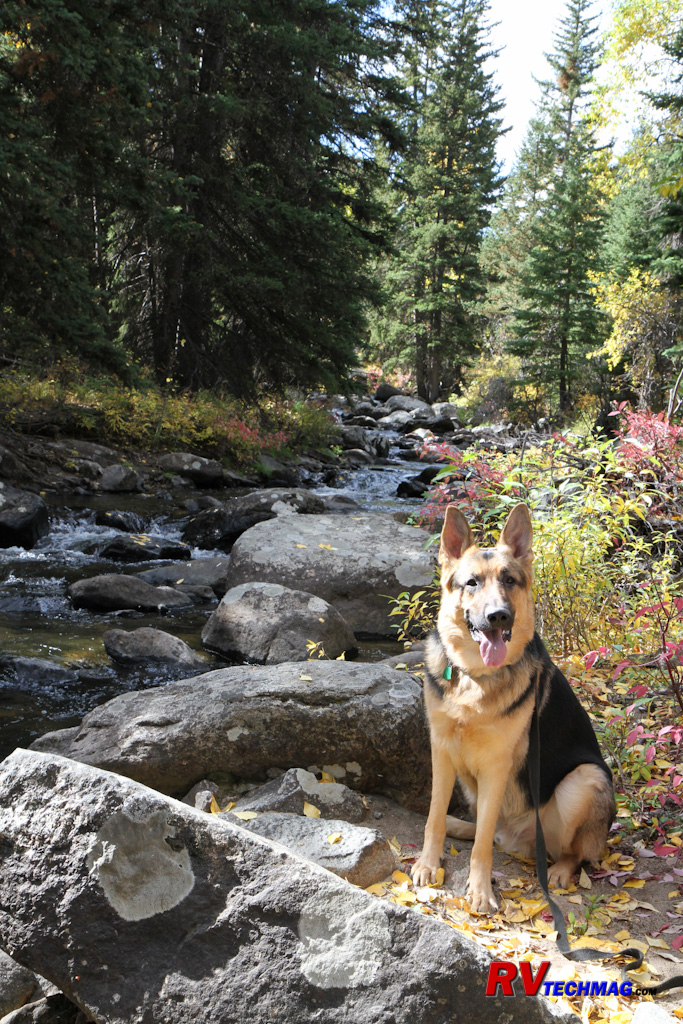
The many streams and hiking trails along Red Grade Road are a great place to exercise your dog.
|
Heading north on I-90 you'll soon be able to reach the Rosebud battlefield where General Crook met up with Lakota Sioux and
Cheyenne warriors, many of whom fought Custer at the Little Bighorn eight days later. The Little Bighorn Battlefield is a national monument and is
just across the border at Garyowen, Montana. This site can be taken as a day trip out of Buffalo or a pit stop if traveling from Buffalo to the
Yellowstone area.
South into Outlaw Country
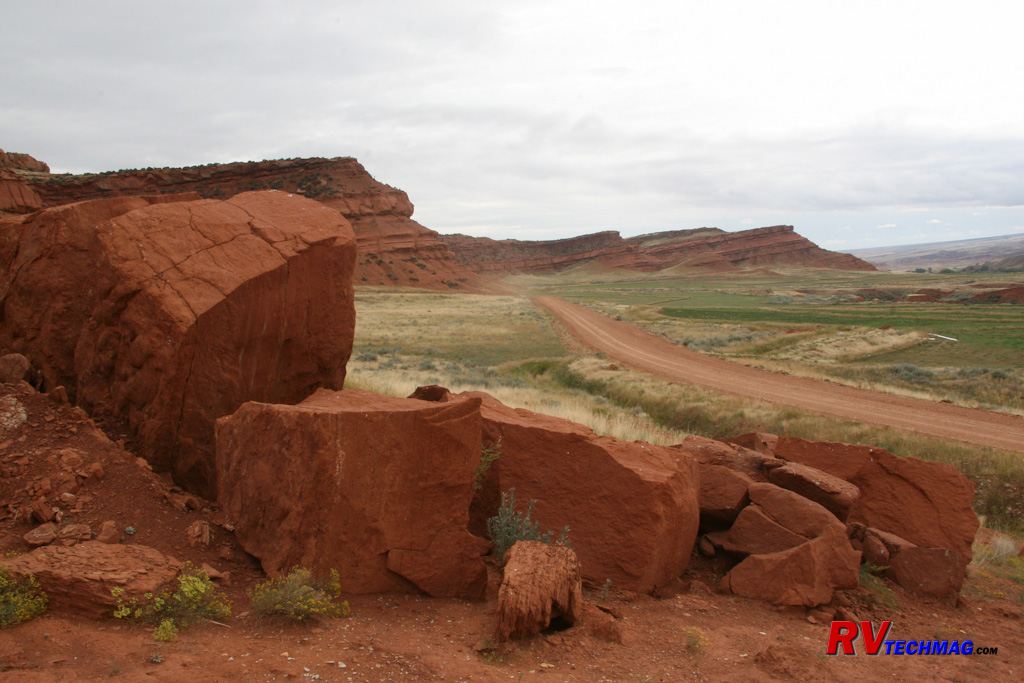
The Barnum Road leaves Kaycee and takes you into the scenic Hole in the Wall country, where Butch Cassidy and the Sundance Kid made their hideout.
Immediately south of Buffalo is cattle country. Crazy Woman Canyon is a "must see" drive. This scenic drive takes you through
the canyon and passes you by streams as it connects US-16 to ranch roads just south of Buffalo. Kaycee is located just south of Buffalo on I-25. It's
the jumping off place to see the Hole in the Wall country. Taking the Barnum Road west out of Kaycee will get you into the favorite hideout for Butch
Cassidy and the Sundance Kid. Four wheel drive roads take you into a US Forest Service primitive campsite overlooking Outlaw Cave. When Butch and
Sundance were being chased by lawmen they would ride into the Hole in the Wall country. Outlaw Cave is situated at the base of a stream filled valley
and overlooks the one draw that leads down into the valley. The wooden rifle perch gives evidence to how they were able to discourage any posse from
following them. A nearby corral was used to store stolen cattle and horses. An overhanging rock shelter in the immediate area features prehistoric
Indian pictographs from the Indians who lived beneath that overhang in the earlier days. The Dull Knife battlefield is also visible from along
this route.
Western history buffs will recall the Johnson County Cattle wars. Many western films were created dramatizing that event, which
occurred in 1892 when large cattle barons hired a number of killers to drive out the small ranchers in the area. The barn at the TA ranch on Crazy
Woman Creek still bears bullet holes from the famous shootout that occurred there. The barn is on private property and is now a guest ranch so
permission would be required to visit the barn. Kaycee is actually named after Nate Champion's KC Ranch. Nate was killed when the hired killers
surrounded his cabin and eventually set fire to it, forcing him outside where he was gunned down. Nate's grave can be found in the Buffalo Cemetery.
|
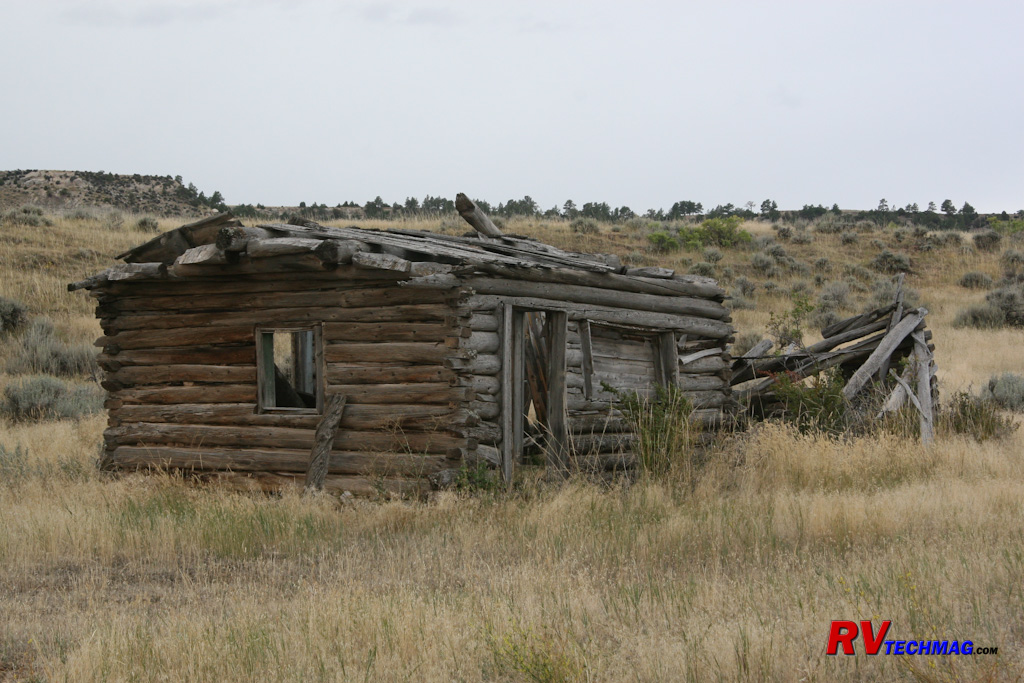
Abandoned cabins and line shacks still dot the Wyoming countryside.
|
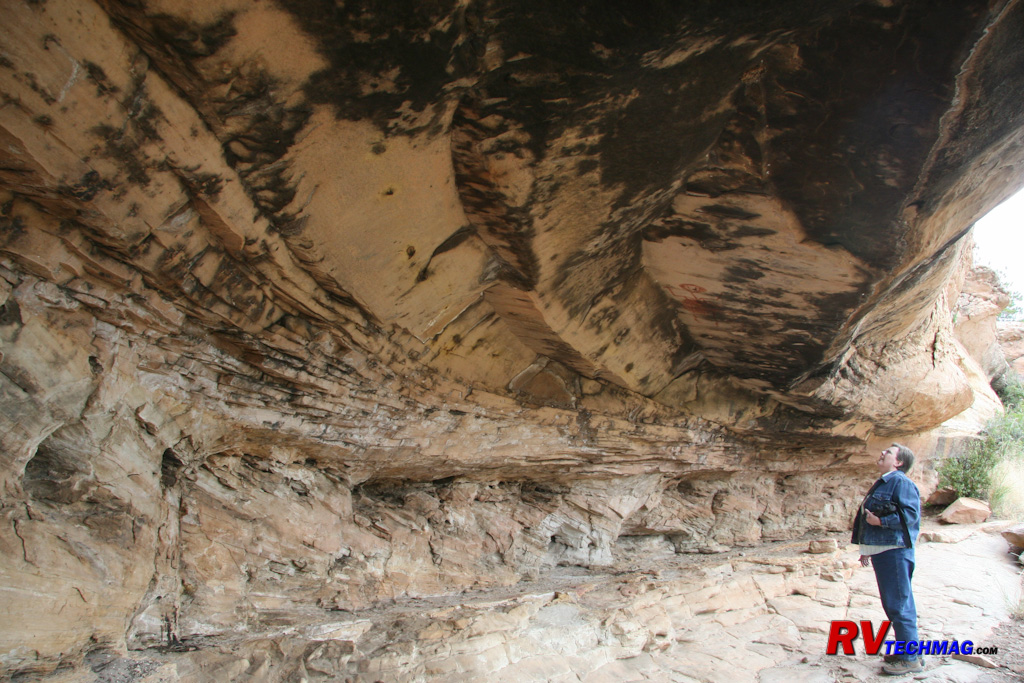
A rock overhang marks the location of a prehistoric Indian dwelling. Pictographs can still be found on the ceiling.
|
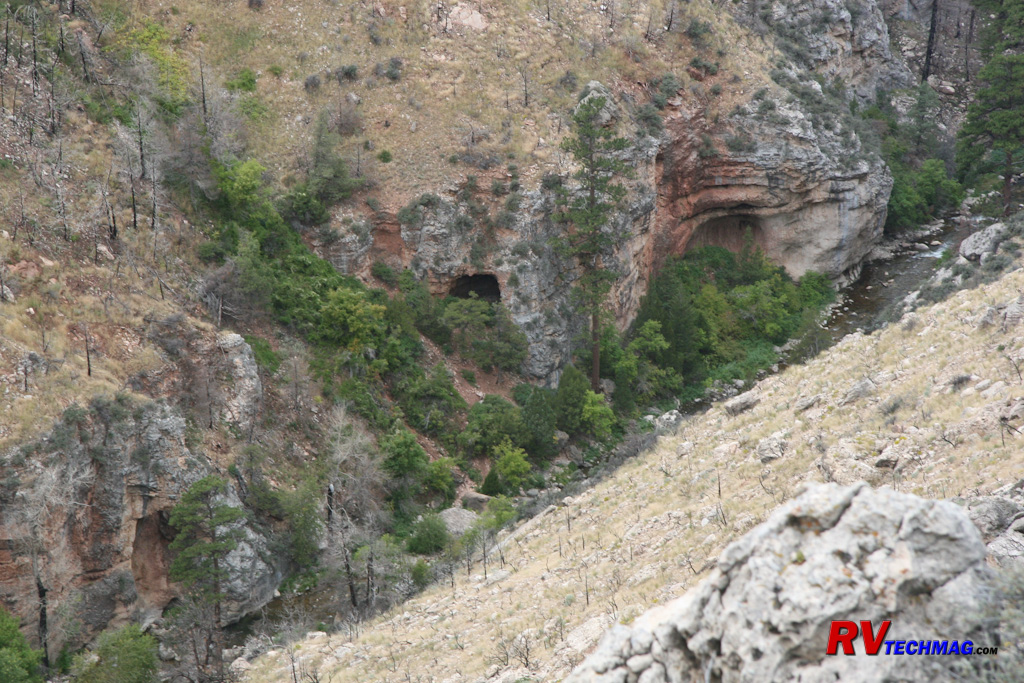
Outlaw Cave was hidden in a canyon in the Hole in the Wall country. Its ideal location make it easy to defend and posse's did not pursue.
|
The Perfect Stopover or Destination
RV owners will find that Buffalo fits any itinerary. Our first visits were simply overnight pit stops while passing through
on our return from Yellowstone. A brief evening drive was enough to warrant interest in additional time on future trips. Eventually we found ourselves
spending a week or longer and making it a destination, rather than a pit stop. There is so much variety here that anyone will find plenty to see and do.
It's also a great place to just kick back and relax.
Sources
Return to Home Page
If you enjoyed this article be sure to recommend RVtechMag.com to your friends, like us on Facebook or Twitter
or subscribe to our RSS feed.



|




















